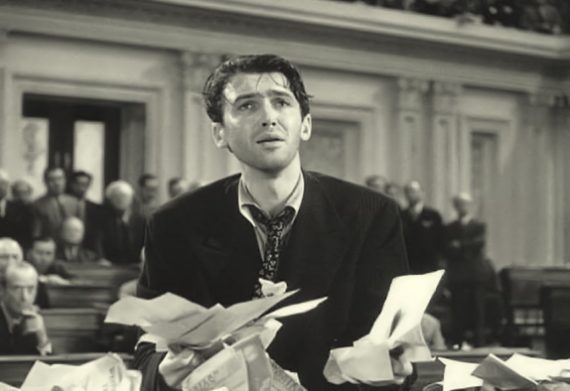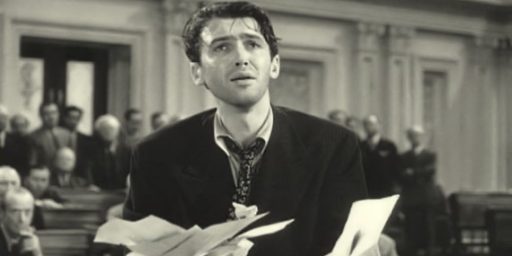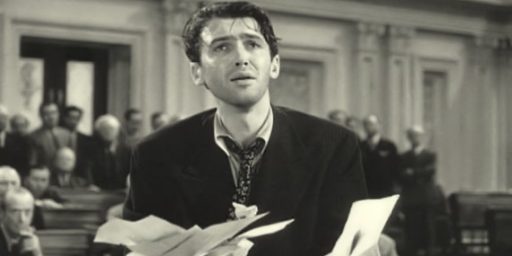Filibuster Reform On The Agenda For 2011?
For the first time in 35 years, the Senate may finally be on the verge of reforming the filibuster.
National Journal reports that the incoming Senate Democratic Caucus appears to have majority support for a reform of the Senate’s filibuster rules:
All Democratic senators returning next year have signed a letter to Senate Majority Leader Harry Reid, D-Nev., urging him to consider action to change long-sacrosanct filibuster rules.
The letter, delivered this week, expresses general frustration with what Democrats consider unprecedented obstruction and asks Reid to take steps to end those abuses. While it does not urge a specific solution, Democrats said it demonstrates increased backing in the majority for a proposal, championed by Sen. Tom Udall, D-N.M., and others, weaken the minority’s ability to tie the Senate calendar into parliamentary knots.
Among the chief revisions that Democrats say will likely be offered: Senators could not initiate a filibuster of a bill before it reaches the floor unless they first muster 40 votes for it, and they would have to remain on the floor to sustain it. That is a change from current rules, which require the majority leader to file a cloture motion to overcome an anonymous objection to a motion to proceed, and then wait 30 hours for a vote on it.
Long time advocate of filibuster reform Ezra Klein isn’t completely thrilled with the proposed reforms, but optimistic nonethless:
They may not do much — at least this year. But even doing a little matters. It puts the minority on notice that the filibuster is not sacrosanct. Having reformed it once, Democrats — and, of course, Republicans, when they retake the majority — can reform it again. There is nothing novel about that: In 1917, the Senate voted to allow 67 senators to break a filibuster, and in 1975, the Senate voted to bring that down to 60. Sen. Tom Udall, who’s been at the center of the efforts to convince the Senate to begin updating its rulebook with each new Congress, has argued that this knowledge will make both the majority and the minority act more responsibly in the future, as they’ll labor under the knowledge that misuse of the rules will mean reform of the rules. If Democrats don’t lose their nerve, we’ll soon find out whether he’s right.
These proposed reforms wouldn’t mean a complete end to the filibuster, of course, but they would mean that it would be harder to maintain and the requirement that the person maintaining the filibuster would have to remain in control of the floor of the Senate in order to keep it alive likely means that filibuster would become less common than they are today, and that isn’t necessarily a bad thing, as I noted earlier this month:
This isn’t the traditional “one man against the world” filibuster of Mr. Smith Goes To Washington or The West Wing episode The Stackhouse Filibuster, but it strikes me as an idea worth considering. There is something fundamentally dishonest about blocking legislation using parliamentary tricks that don’t actually require the blocking party to take an affirmative action, but instead force the party trying to advance the to assemble a super majority in order to even get to the point of being able to vote on the bill in question. There is, as Steven Taylor noted several months ago, something problematic about the fact that legislation can be blocked when it has 59 votes out of 100, even more so when that can be accomplished through a procedural vote rather than debate.
On the right, William Jacobson and Jazz Shaw both seem to doubt that the Democrats will go through with this, on the theory that they will want to have this arrow in their quiver when they’re in the minority again, which could come as soon as 2013 if the GOP is able to take back the Senate in 2012. I’m not so sure. First of all, as noted, these proposed reforms wouldn’t completely eliminate the filibuster, they would just make it a little more difficult to maintain and require the minority to make their actions far more public than they are today. After the experiences of the past two years, I imagine there’s plenty of Democrats who are willing to sign up for reform at this point. Secondly, there’s nothing sacrosanct about the filibuster or the 60 vote cloture rule. As Ezra Klein notes above, that number of votes required to break a filibuster has changed three times in the last 100 years, there’s no reason why it can’t change again. Finally, Bernie Sanders showed us just two weeks ago what a real filibuster should look like.
That’s not saying that the filibuster should be entirely eliminated, of course. In one form or another, it’s been part of the Senate for the better part of a century, and it helps to ensure that the Senate serves its intended function of putting a brake on the populism of the House of Representatives.
James Madison explained this idea quite succinctly in Federalist No. 62:
[T]he equal vote allowed to each State is at once a constitutional recognition of the portion of sovereignty remaining in the individual States, and an instrument for preserving that residuary sovereignty. So far the equality ought to be no less acceptable to the large than to the small States; since they are not less solicitous to guard, by every possible expedient, against an improper consolidation of the States into one simple republic.
Another advantage accruing from this ingredient in the constitution of the Senate is, the additional impediment it must prove against improper acts of legislation. No law or resolution can now be passed without the concurrence, first, of a majority of the people, and then, of a majority of the States. It must be acknowledged that this complicated check on legislation may in some instances be injurious as well as beneficial; and that the peculiar defense which it involves in favor of the smaller States, would be more rational, if any interests common to them, and distinct from those of the other States, would otherwise be exposed to peculiar danger. But as the larger States will always be able, by their power over the supplies, to defeat unreasonable exertions of this prerogative of the lesser States, and as the faculty and excess of law-making seem to be the diseases to which our governments are most liable, it is not impossible that this part of the Constitution may be more convenient in practice than it appears to many in contemplation.
Thanks to the passage of the Seventeenth Amendment and other changes in American politics over the past two centuries, the “protection of the states’ purpose of the Senate has been muted somewhat, but the Senate still plays the role that Jefferson and Washington anticipated it would:
The “Senatorial saucer” conversation between George Washington and Thomas Jefferson is part of U.S. Senate legend. Jefferson had returned from France and was breakfasting with Washington. Jefferson asked Washington why he agreed to have a Senate.
“Why,” said Washington, “did you just now pour that coffee into your saucer before drinking it?”
“To cool it,” said Jefferson; “my throat is not made of brass.”
“Even so,” said Washington, “we pour our legislation into the Senatorial saucer to cool it.”
It strikes me that the Senate can continue fulfilling that role without resorting to parliamentary tricks that everyone, including the people using them, knows serve no real purpose at this point.






This will be a good start if they pass it. The filibuster was an accident. It is now used way too often. Removing the ability of one Senator to block action over a very long time period would be a significant improvement.
Steve
This can’t happen soon enough for me; indeed, I would kill it altogether. We have a bicameral legislature, which I love and would never want to do without, but adding a supermajority requirement is a step too far.
But Doug, Madison is explaining the role of the Senate in the bicameral structure of the Congress. He is decidedly not talking about the filibuster, which didn’t come into existence in the mid-19th century (IIRC).
Ignoring a minority group especially a very significant size one, is asking for trouble. This is true regardless of whom that group is composed of. It is tempting to say fine “do it” for we will be in the Majority someday but the results will be even greater divisions within this country. Many seem to want a pure or close to pure democracy. Doing so will greatly hasten the breakup of this country.
Many have condemned the hyper-partisanship yet they partake in it and help it to continue to grow.
Steve (Taylor),
Yea I am aware of that, but I think that, properly utilized, the filibuster can have a positive role. It’s gotten way too far out of control over the past two decades or so, however, which is why the rules need to be changed just as they have been changed in the past.
There’s an old saying, in the US at least, that you shouldn’t take any power you wouldn’t feel comfortable with wielded by your political oppopnent.
@Doug: My point was (made too obliquely) is that the functions of the Senate you value existed, at least in the mind of Madison and other Founders, sans the filibuster. This suggests that perhaps we don’t need it the way some think we might.
I can understand a preference for a modified version, although I have hit a point where I don’t think we need it at all.
Regardless of which political party is in power, I object to the lack of real debates on important issues facing our country.
I am against any rule/practice/procedure which obstructs political debate.
The US Senate’s filibuster, no matter what some might have said and say, seems to me to be no more than a thin veil behind which scoundrels and petty/mean-spirited politicians hide.
Think the big problem I see could be resolved by having collegiate-style, Munk-type real debates. Expanded CSPAN coverage would also help.
I raise this issue because I have been mystified by Backroom McConnell’s lack of any specific proposals/program as viable alternatives to legislation enacted by Democrats. He and others should be required to support their ideas, and not “just say ‘No'”